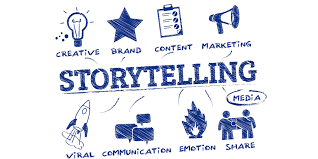Storytelling is a powerful tool that has been used for centuries to convey important messages, entertain, and connect with others. From ancient myths and legends to modern movies and television shows, storytelling is an integral part of human culture. In this article, we’ll explore the power of storytelling and why it’s important in our lives.
Storytelling Connects Us
One of the main benefits of storytelling is that it connects us with others. Whether we’re sharing personal anecdotes with friends or listening to a riveting tale from a professional storyteller, storytelling helps us build connections and find common ground with others. It can be a powerful way to build relationships and strengthen bonds.
Storytelling Preserves Culture
Storytelling is an important way to preserve cultural traditions and history. Many cultures have passed down their histories and traditions through storytelling for generations, allowing people to learn from the past and understand their place in the world. Stories can help us understand where we came from and how we got here, and they can provide a sense of continuity and connection to our cultural heritage.
Storytelling Teaches Lessons
Stories can be a powerful tool for teaching important lessons and values. Whether it’s a classic fable with a moral lesson or a modern story that tackles complex social issues, stories can help us understand complex ideas and engage with new perspectives. They can help us develop empathy, understanding, and critical thinking skills.
Storytelling Inspires Creativity
Storytelling is a great way to unleash creativity and explore new ideas. Whether you’re writing a novel, creating a movie, or telling a story to a group of friends, storytelling allows us to explore new worlds, experiment with different perspectives, and let our imaginations run wild.
Storytelling is a Form of Entertainment
Finally, storytelling is a great form of entertainment. Whether we’re watching a movie, reading a book, or listening to a story, storytelling can transport us to new places, make us laugh, and keep us on the edge of our seats. It’s a form of escapism that can provide a much-needed break from the stresses and challenges of everyday life.
Tips for Effective Storytelling
Know Your Audience
One of the keys to effective storytelling is knowing your audience. Consider who you’re telling the story to and tailor your approach to their interests and preferences. For example, if you’re telling a story to children, you may want to use more colorful language and incorporate visual elements to keep their attention.
Use Vivid Language
Vivid language is essential in storytelling. Use descriptive language to paint a picture in your listener’s mind and bring your story to life. Use sensory details to describe the sights, sounds, smells, and emotions of the moment you’re describing.
Use a Strong Narrative Structure
A strong narrative structure can make your story more engaging and help your listener follow along. Consider using a classic narrative structure, such as a hero’s journey or a three-act structure, to help guide your story.
Create Tension and Conflict
Tension and conflict are essential elements of a great story. Create obstacles and challenges for your characters to overcome, and build tension by withholding information or raising the stakes.
Practice, Practice, Practice
Finally, practice is essential for effective storytelling. Practice telling your story to different audiences and seek feedback from others. Use your audience’s reactions to refine your story and make it even more engaging.
In Conclusion
Storytelling is a powerful tool that has the ability to connect us, teach us, inspire us, and entertain us. By using these tips and techniques, you can become a more effective storyteller and share your own stories with the world.





